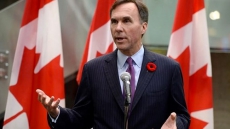OTTAWA — Finance Minister Bill Morneau says the federal Liberal government remains committed to boosting funding for health care, even though his maiden budget devotes not a dime to home care or a new health accord with the provinces.
The Liberals made "an immediate commitment" in last fall's election platform to invest $3 billion over four years to deliver more and better home care, including palliative care, starting with a $415-million infusion this year.
They also promised to restart negotiations with the provinces on a new health accord, although no price tag was ever attached to that promise.
Morneau says the only way to improve the health system is by working with the provinces, which have constitutional responsibility for delivering health care.
He says those discussions haven't progressed far enough yet to include a funding commitment in Tuesday's budget.
But NDP health critic Don Davies says the omissions constitute a "completely broken promise."
"During the last campaign, the Liberals told Canadians they would invest $3 billion over four years in home care," Davies told the House of Commons on Thursday.
"What does the Liberal budget commit? Absolutely nothing."
Earlier Thursday, during a roundtable interview with The Canadian Press, Morneau insisted the Liberals "remain committed to our health care system."
"We know that that's important for every single Canadian. We also know that the only way to get to good conclusions on health care in our country is by working together with the provinces."

Morneau said negotiations with the provinces will include discussions on home care, palliative care and mental health but "we're just not at the stage where that was something that we wanted to put forward in the budget because those discussions need to happen for us to have a clear sense of direction."
With the government poised to introduce a new law governing medical assistance in dying, health experts have argued it's crucial to simultaneously improve palliative care so that terminally ill Canadians won't feel they have little choice but to end their lives prematurely.
In the Commons, Health Minister Jane Philpott assured Davies she's working "every day" with her provincial counterparts on a long-term health accord "that will include a number of initiatives, including a $3-billion investment in home care."
The last 10-year health accord, which included an annual six-per-cent increase in health transfers to the provinces, expired in 2014. The previous Conservative government refused to renegotiate it and unilaterally declared that the six-per-cent escalator would end in 2017.
Although they denounced the Conservative move and promised to negotiate a new accord with a long-term funding agreement, the Liberals did not specifically promise to reinstate the escalator. And Philpott appeared to suggest Thursday that it's not in the cards.
At $36 billion, health transfers are already "the largest in Canadian history," she told the Commons.
As for not putting the promised $3 billion in additional home care funding on the books yet, Philpott said later that the federal government first wants to strike an agreement with the provinces about how that money is to be spent "and what Canadians should expect to see as a result."
However, Davies argued that if the money isn't in the budget, it will have to come out of existing funding for other health initiatives.

"The minister can't skate on this," he said. "She can't claim to honour those promises and then not have that money in the budget to back up the promises. It's as simple as that."



